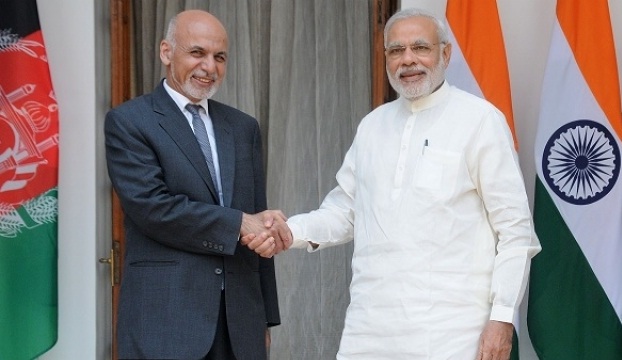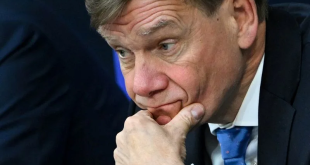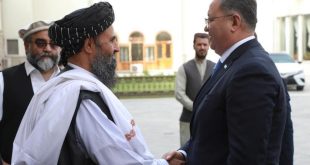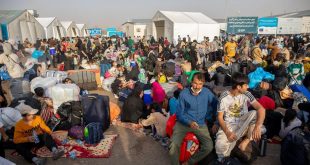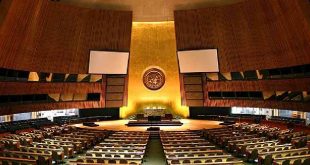Afghanistan President Ashraf Ghani delivered one of his most scathing speeches about Pakistan’s role in abetting terror in the region at the Heart of Asia conference in Amritsar on Sunday, alleging that without Pakistani state support, the Taliban “wouldn’t survive beyond a month”. In an exclusive interview with Suhasini Haidar, he spoke of his frustration with Pakistan, friendship with India and hopes for the region.
Your speech at the Heart of Asia included some strong comments for Pakistan, directly telling Pakistan to use money it had offered for Afghanistan’s development better by fighting terrorism with it in its own countries. What led you to pinpoint Pakistan at this international conference?
I engaged Pakistan, I went there and not only visited with the civilian leadership but with the military leadership. I even went to their GHQ (Military headquarters), because each country has their own distinct place for institutions. My message was that there was a window. It could be broadened to a door or a corridor, or it could shut. We did everything to ensure peace with Pakistan. 2015 and 2016 have been extremely difficult years and the violence that has been inflicted on our people needs to be registered. To be quiet when people are dying is not acceptable. I am an elected political leader, I need to reflect my people’s sentiment. Because the question of terrorism is not just a threat to us but to Pakistan and the Asian region, and hence the need for a public statement.
Has the window of opportunity then closed?
They need to open it. We opened the window, now it’s closed, so it’s their turn to open it.
Both India and Afghanistan expressed their anger over this continued terrorism at the conference, which seemed to overshadow the conference. What are your hopes from the process now?
My speech was in four ‘acts’. The first was our celebration of our relationship with India. The second, a celebration of the new consensus on Afghanistan from the global community. The third act was the prospect of Asian economic integration. And the fourth was about what we will be deprived of if we don’t do it. Terrorism is depriving us of this and we need enduring solutions at the Heart of Asia. It is becoming a meaningful process. Our goal would be to link China on one hand to Iran on the other, and also to India. South Asia is the least integrated area and has immense potential.
The worry here would be that it would also be one step from connecting to the China Pakistan Economic Corridor as well, given the rail line from Yiwu to Mazar now.
One corridor is not against another. The logic of price will prevail. Afghanistan is so much easier to go through. Northern Afghanistan is flat. Eventually railway connectivity is to everyone’s benefit, and we shouldn’t see it as a zero sum game.
To come back to concerns over terror, At the SAARC conference, India and Afghanistan came together to boycott Pakistan so they couldn’t host it. Is this policy of isolating Pakistan working?
We don’t intend to isolate Pakistan, but when we are under attack, we need to remind that it will not be tolerated. Engagement is essential, but only engagement that is meaningful. Last year, I went to the Heart of Asia in Islamabad and I was repeatedly assured of a changed policy. Instead we got the worst year of conflict in the last 15 years. An isolated Pakistan is not in the region’s interests, but Pakistan’s leadership must take action beyond its verbal assurances.
In May 2015, in an interview to The Hindu you had said that if Pakistan continues to block transit trade with India, Afghanistan will block its access to Central Asia…is that still a threat?
We actually went through with it. Trade between Afghanistan and Pakistan has been much reduced. Economically Afghanistan has become part of Central Asia. The opening to the port in Turkmenistan fundamentally changes our dependence on the route through Pakistan. It’s five times cheaper and reliable. This image or idea that we are dependent on the port of Karachi must be removed. Afghanistan is at the Heart of Asia, and a heart has many valves. We are de-blocking those valves at present.
The big change in India-Afghanistan ties in the past year has come from India’s decision to provide military helicopters. To quote Mr. Modi on the hesitations of history with the US, has India overcome hesitations with Afghanistan now?
India is converging with Afghanistan. There is nothing secret. It is a transparent state to state relationship. We are driven by common goals and opportunities.
Yet they weren’t always as good when you began your tenure…
They were, but some commentators only saw a zero sum game. Afghanistan wants to become a centre of cooperation. PM Modi and I have had a meeting of minds from the moment we met, and that has resulted in this convergence.
India and Afghanistan have announced a new air cargo agreement now. How will that change the situation, given that we already have many flights between us?
We are essentially reviving the old caravan route….in the sky, when we look for high value, low volume trade. Instead of seeing our trade over land being blocked, this corridor gives us predictability on goods like medicines. India produces cheaper medicines than anywhere. Having an organized process will do wonders for our trade. Afghanistan has a name brand in India. From Babur who brought fruit to India to Tagore’s Kabuliwala, there runs a straight line.
How viable is the other alternate to the Pakistan land route, Iran’s Chabahar port? Gwadar is already seeing Chinese goods go through from the CPEC, Iran is completing its INSTC to Central Asia, is there room for more than bilateral trade through Chabahar port now?
What we need to look at is not just Chabahar alone. Iran has 11 neighbours that it is connected to, neighbours like Turkmenistan and Azerbaijan. The issue is Indian trade to Central Asia through Afghanistan, and that makes a lot of sense.
To come to the security situation in Afghanistan, you spoke with U.S. President Elect Trump recently, how do you assess the U.S.’s role in Afghanistan under him? Will it shrink?
President Obama made a historic decision to keep a medium term outlook of 4-years on security for Afghanistan, and President Trump will most likely keep that. 2015 was our year of survival, 2016 was the year of our organized defence, 2017 and on will be years of success and consolidation. Look, in 2014 there were 140,000 foreign troops in Afghanistan, now there are 10,000 and mostly in supporting roles. Afghan security forces have really come a long way. And now we have an airforce.
What is the role for India then? Has the problem of spare parts, delivery, now been resolved, and will there be a trilateral arrangement with Russia?
We welcomed the helicopters India sent. Our fleet of helicopters were mostly Russian, and India’s help has been invaluable in helping us maintain them. We will now purchase U.S. equipment. India’s delivery has been a life saver.
Where are talks with the Taliban now?
We signed a peace agreement with the Hizb-e-Islami this year, so its important to know that an intra-Afghanistan dialogue can work. We can only hope the Taliban will follow the same process. Taliban has just made a pronouncement that it won’t attack infrastructure here, that’s because they realize it is very unpopular to do so. The Taliban used to say, the west had watches, but they had the time, and so would win. The Afghan public is turning against such destructiveness. Also there is the emergence of other actors like Daesh/IS who could upstage them. So we hope they will realize the need to come to the table.
You sound confident, but Taliban appears to control large areas now. We saw a public hanging this week of an engineer. How much does the government really control?
Around 66-68 per cent is controlled by our forces, about 10 per cent with the Taliban and the rest is contested. There has been a stalemate, but that is now turning in favour of the government. The territory may not have changed, but we are now maintaining our positions instead of the 140,000 foreign troops. The unity of the Afghan Army has been significant in this.
So will talks with the Taliban now be intra-Afghan, is Pakistan out of the process, given that we saw them host talks in the past ?
Taliban are a red herring in discussions with Pakistan. Because they need to own up to the threat of terror.
Pakistan often says as an explanation, that they have housed millions of Afghan refugees, they can’t tell which are Taliban….
This excuse is old. One of our corps commanders from Helmand went to Quetta and offered to show the commander there the very houses where Taliban leadership lives. There was silence in reply. The Afghan refugees believe their future is in Afghanistan….if they want to send them back we will take them, even if we have only one loaf of bread to share. I don’t need foreign aid, I need peace to build our country. The world has been reconvened that Afghanistan is an investment that will yield. (Thehindu)
 Afghanistan Times
Afghanistan Times
